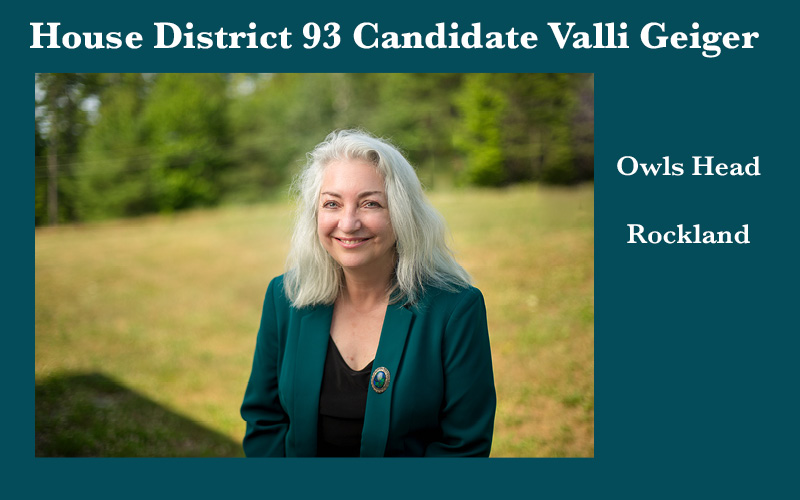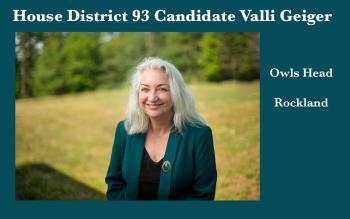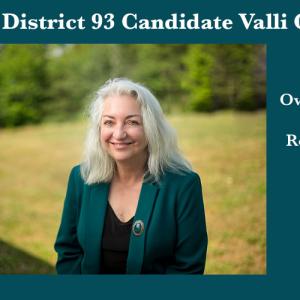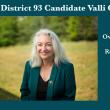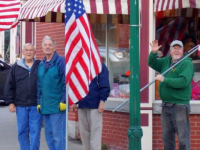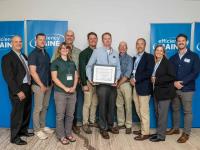On the issues: House District 93 Candidate Valli Geiger
Penobscot Bay Pilot has posed questions to each candidate running for Maine State Legislature, providing the opportunity for the public to better understand their position on issues important to the state. Candidates responding with their individual written answers will have their responses stored in the Pilot’s 2020 Election Resource Guide. Valli Geiger, Democrat, is seeking election to represent Maine House District 93, which includes Owls Head and Rockland.
1. Please provide a concise biography of yourself.
I grew up in upstate New York, moving to Maine after graduating from college with a bachelor’s degree in nursing. I was hired by Pen Bay Medical Center, working on a medical/surgical unit, nights, full time. I drove here in an old Chevy Nova, Esmerelda, named for the witch on Bewitched whose spells constantly malfunctioned, like my car. I arrived with my father’s bookcase, a set of dishes, sheets, towels and a Siamese kitten. I thought I would be here a year or two, then return to New York, but 40-plus years later, this is home.
I have married here and raised a son here, now 26. He is still here, and my husband and I feel lucky that he continues to live close by and was able to find good work here. Like many young Mainers, he wants to be here.
I traveled throughout Asia for nine months at age 24. It changed the way I look at the world. I went to graduate school, completing course work for a dual master’s degree in public health and public administration, but never wrote my thesis.
I worked as a health policy analyst in Augusta, was director of the state’s largest hospice and worked for many years on health care reform in Maine, improving/redesigning primary care.
About 10 years ago, I began to feel burned out. As clinical director at the Maine Primary Care Association, I was on the road visiting Federally Qualified Health Centers from Fort Kent to York, Maine constantly and feeling like I wanted to be more involved in my own community.
I left my job, went to graduate school, earning a master’s in sustainable design. It was another turning point for me, leaving me keenly aware of the imminent threat of climate change, the importance of good design in creating healthy, walkable communities, the possibility of people dancing/living with our habitat and those we share it with instead of destroying it. I was invited onto the Comprehensive Planning Commission, became chair the following year and then ran for City Council.
I will complete my sixth year in November, with one year as mayor. I continue to work as a nurse, at Togus VA for six years and now at Lincoln Health.
2. What are the three most pressing issues facing Maine, as a state, today, and how would you like to see them resolved?
Aging workforce, climate change, Lack of well paying jobs for young people. These issues are intertwined.
Maine has long had the lowest per capita income of the New England states. We are used to paying low wages, with many having to work 2-3 jobs to make ends meet. I support a living minimum wage. We had an unexpected experiment during COVID19. The federal unemployment program provided $600 per week ($15/hr x 40 hours) to Maine’s unemployed. This was very positive for Mainers, many earning more than they were at their former jobs. It kept Maine’s economy afloat until it ran out in July. A reminder of Mr. Ford’s wisdom of paying his workers enough to afford to buy his cars. Our low wages drive young people away.
People love Maine, they want to live here, they want to return here after college, we make it very hard. A focus on climate change (Green New Deal) would both help the planet and bring a large number of well paying jobs to Maine. Renewable energy keeps the money in Maine instead of going to out of state corporations or other countries.
3. How will you protect the local (municipal) taxpayer as you help shape a state budget?
As a city councilor, I have worked tirelessly to change the tax structure. Maine people and Maine cities like Rockland had a deal with the state. They asked that Maine pay 55% of education costs and return 5% of the sales tax generated in our cities back to us to pay for infrastructure and public services. That promise has been broken.
As Mayor of Rockland, I brought Rockland into the Mayors’ Coalition, a group of service center cities like Rockland, advocating with the state to return the municipal revenue sharing portion back to 5% as dictated by law from 2%.
We were successful last year, after much testimony, lobbying to increase our share from 2% to 3.5%, and this year to 3.75%, bringing back several hundred thousand dollars to Rockland.
I will continue to lobby as a representative to return the full 5%.
As a city councilor I have met with RSU 13 board members, the Legislative Education Committee and the state Education Commission to understand how it is that Rockland receives millions less per year when compared with other service center cities like Belfast, Bath and Augusta, despite similar populations, students numbers, and a lower median income. Rockland receives 16% from the State of Maine. This cannot stand, it is starving our schools, our infrastructure and harming elderly and working class home owners.
4. Given the shortfall of housing in your district, how should the state approach the need for more workforce housing, as well as re-entry housing for the formerly incarcerated, and emergency shelter for those suffering through extended power outages?
Maine has some of the oldest housing stock in the U.S. New construction and renovation costs have risen by 42% per square foot in just a little over a decade. Two-thirds of Maine households use fossil fuels for heat, contributing to climate change, local pollution and high energy costs. Young people are increasingly priced out of housing, both owning and renting.
Businesses in District 93, are unable to find and keep workers due to both housing costs and availability. This means Rockland and Owls Head can’t attract teachers, nurses, police officers, fire fighters, engineers, designers, welders, and service workers. Businesses can’t expand, start ups look elsewhere.
It is critical that Knox County address housing.
As a City councilor I have worked hard over the last six years to address housing in our area. We worked with Habitat for Humanity, offering them first refusal when a house came to Rockland through foreclosure. We created a zoning change allowing Habitat to do a small house project, bringing 12 new small, energy efficient, and affordable houses to Rockland, offering 12 Rockland families the opportunity for home ownership and housing stability.
Rockland now allows tiny and small houses on wheels in Mobile Home Parks, providing another avenue for first home buyers to get affordable housing.
But we need to scale up, and here the state could play a role. We need affordable housing for the elderly, and there are great projects by people like Cyndi Taylor, taking old school buildings like Cony High School in Augusta and creating beautiful small apartments for those 55 and up. But we need more.
We need to make sure elderly homeowners who want to remain in the community have a place to go when they can no longer keep up with a house too large for their needs.
We need more apartments for the young workers who want to live here and we need the ability to create buildable lots for new housing. People are flocking here, houses are being snapped up by out of state buyers for 2nd homes, but new workforce housing is scarce.
As a state representative I would want to look at which regulations provide tiny benefits but big barriers to affordable new construction, work to increase the amount of elderly housing projects and think creatively about affordable housing, like small manufactured housing as a solution to homelessness and workforce access.
5. What legislative committees would you like to serve on and why?
I would like to continue the work of Representative Pinny Beebe-Center on the State and Local. I am also interested in Energy, Utilities and Technology: to continue to move Maine forward with affordable, renewable energy, Health Coverage, Insurance and Finance: with my background in health policy and health care reform, I would bring a strong voice for affordable health care. Finally, I would be interested in being on Appropriations: all work on other committees, all the bills passed are for nought, if Appropriations does not provide the funding.
6. Maine’s economy relies on small and micro-businesses. How will you help the entrepreneur succeed in this state, especially given the pandemic?
Take a fresh look at the regulatory structure to remove barriers to new and small business. Bring back the Women, Work and Community program for training women to take the entrepreneur leap, bring back New Beginnings, another program focused on training and mentoring those wanting to create new businesses in Maine.
Enhance and enrich the SCORE program and the small business loan programs to give a hand up. Undercapitalization, is the strongest predictor of failure with new businesses.
7. What is your vision for affordable health care?
While my ultimate vision for healthcare would be a national system with a focus on prevention, primary care, integrated mental and physical health systems, with the federal government bargaining with pharmaceutical companies like every other industrial country does for better pricing.
In the meantime, I am willing to work on the margins with each step focused on helping Maine people have access to quality, affordable healthcare.
No one should have to choose between rent and healthcare, between medicine and heat. We ignore and underfund public health and primary care: forgoing the early steps to improving people’s health: preventing and managing diabetes, early heart conditions, obesity, hypertension and stress. Instead of spending billions on treatments at the end stage of disease: dialysis, rehabilitation after strokes, heart surgeries and transplants.
Those should be rare because we prevented them, allowing people to lead healthier, higher quality lives.
8. Does the State of Maine need to improve its public health system?
Yes, when the pandemic hit, the State of Maine had to try and ramp up quickly after years of public health cuts by the LePage administration.
The Maine CDC had to ramp up in a hurry, hiring at least 130 public health officials to learn fast, on the job. Maine did a good job, but having to design systems or rebuild systems on the fly, puts us at a disadvantage globally.
We need to hold onto and improve our newly enhanced public health system so we are ready for the next pandemic and can continue
to focus on other public health issues like: vaping, opiate addiction, obesity and domestic violence.
9. What are the greatest strengths in your district, and how do you hope to support them?
If there is one thing I have learned about my district it is that people feel passionately about their community, whether they have been here for generations, or just moved to town. There is something wonderful about our area. People care, they show up, they still believe in the Common Good.
People in this district consistently support education budgets and infrastructure bonds, despite the hardships of increasing property taxes.
My community shows up at town hall meetings, city council meetings, people volunteer for the food bank, soup kitchens, the libraries, city and town committees and boards. This is still the place that fills your refrigerator with meals when you are ill, takes turns driving people to chemotherapy, sits with the dying.
I am part of an active group of women who love their community and want it to thrive; they show up, they take their civic engagement seriously and I am proud to be one of them.
10. What are the greatest problems to address in your district, and how do you intend to address them?
The district faces very high education costs for RSU 13. We receive millions less PER YEAR than communities like Bath, Augusta and Belfast, despite similar pupil size, populations and poverty rates.
The majority of our property taxes go to our schools, because we receive one of the lowest rates of state support per pupil. We receive just 16% funding for RSU.
Rockland has also been denied $1 million a year for the last 14 years in Municipal Revenue Sharing. The state forbids the ability to have a local tax and in return is supposed to return the equivalent of 5% of the sales tax generated here. Instead, we have received less every year.
During my time as Mayor, Rockland joined the Mayor’s Coalition, a group of service centers, who worked tirelessly to increase the revenue share back to 5%. We were successful in increasing it from 2% to 3.50% last year and 3.75% this year. The lack of state support has left Rockland and Owls Head residents paying millions more per year in property taxes, it has left Rockland strapped for funds, falling behind in our infrastructure building, and maintenance. It keeps us from addressing our current and future needs. It keeps education services from being as robust as they need to be to meet the needs of countless students needing more support to thrive and grow in school.
11. What is your position on law enforcement reform in the State of Maine?
I find both “Support the Blue” and “Defund the Police” to be polarizing phrases that add nothing to the conversation. That there is systematic racism is obvious to all who are willing to see. That the police have become increasingly militarized over the last several decades using increasingly aggressive tactics is also true.
Like many organizations before them, too many police departments have failed to hold their their officers accountable and too many police unions are willing to go to the mat to support bad actors. “Culture eats change for breakfast” is a term we used in health care reform.
We are seeing it in the failure of police reforms to bring needed change. Here in the Midcoast, Maine we are in a very good position. I have nothing but admiration for Chief Young and Sheriff Carroll. Here in the Midcoast to have two law enforcement leaders with integrity. Rockland has adopted policies that include “Duty to intervene” when an officer sees a colleague engaging in excessive use of force, no use of chokeholds and a commitment to CIT training for all officers. Knox County under Sheriff Carroll chooses not to do “No knock raids”.
But I don’t want Maine people to be dependent on leaders having integrity, I want strong guardrails in place to hold departments to a standard that focuses on community policing, de-escalation skills, CIT training (Crisis Intervention Team) so that we can feel confident we have departments who live the motto “To serve and protect.”
12. What are your thoughts about the state’s response to the pandemic?
The fact that Maine is second or third in the nation with Vermont and New Hampshire, for lowest positivity rates speaks for itself. We are lucky to have Governor Mills and Dr. Shah, using science and data to determine their actions. Because our case rate is so low, we have the ability to jump on an outbreak like the wedding in Millinocket. It is tragic, our economy has taken a severe hit, but we are in a good position to slowly rebuild and reopen. It will be a couple of very rough years. Watching the states that re-opened without the low positivity rate and ability to contact trace, has been to watch slow motion disasters with needless deaths, thousands facing chronic post covid conditions and crashing economies as they re-close.
13. Do you support construction of the 145-mile Central Maine Power transmission line from Quebec to Massachusetts?
I do not. CMP has lost all credibility as a company/utility serving Maine people’s interests. In Maine, utilities are given a monopoly and a guarantee of a 10% profit margin, in return, they must promise, infrastructure building and maintenance, excellent consumer protection and service, quick return to power after storms and accurate, timely billing. They have failed on all counts.
14. Free space! Is there anything else you want voters to know about you or your vision not addressed through this questionnaire?
I have worked out of Augusta for most of my career and about 10 years ago, decided I wanted to be a part of my community. I was asked to join the Comprehensive Planning Commission and that started my involvement with the city. I believe we have three phases of our lives: first-third we are students, second-third we are householders and the last-third we are called to serve our community. It is a great privilege.
Event Date
Address
United States

